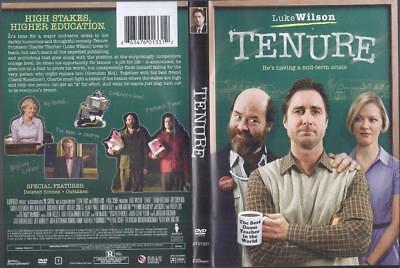
6/1/20: Too Good for Hollywood #poetry #movies #teaching
Yesterday’s offerings in the COVID-19 film festival were The Dresser, the highly regarded 1982 film about the relationship between the lead actor/director of a touring Shakespearean Rep Company in Britain during World War II, and his Sancho Panza homosexual dresser who keeps his body and soul together and the musty show going on;
and the 2009 straight to video effort Tenure directed by the mysterious Mike Million (his Twitter feed says that is his real name) and starring Luke Wilson as a good teacher.
Both films are also good featuring some nuanced acting and sensitive writing, and each are compromised by distractions for the sake of the commercial audience: The Dresser gets demerits for its preoccupation with plot — the lead actor dies in the end, the dresser loses the meaning and the unrequited love of his life (the lead actor was more concerned with being loved than loving). The Dresser can show us all it has to reveal without the neat “action” of the dramatic event at its conclusion. Albert Finney and Tom Courtenay are great actors who reveal the relationship between their respective characters in its complexity. Ronald Harwood is a fine writer. He doesn’t have to underline anything.
Tenure is a nice reflective character study partially buried under the requirements of a standard Hollywood loner/loser comedy. David Koechner, who is an amiable presence when comedy is called for, is more than miscast here. His character shouldn’t be in the script. Koechner drives a ridiculous sub-plot that has no basis in reality in the belief that idiotic irreverence draws audience. College professors trying to “TP” (festoon toilet paper on someone’s property) a pompous dean, but getting the wrong house — is a comedy misfire that should have been spotted early in pre-production. But the bet was that the then middle-aged Animal House generation still wanted the fantasy of doing cool fraternity pranks, at least vicariously. They didn’t. The first place that audiences encountered Tenure was Blockbuster Video.
Tenure’s writer/director doesn’t have a Wikipedia page. I have a greater internet presence than he does, and mine is definitely a quality-not-quantity affair. What happened to Mike Million? I debated with myself whether to use a question mark at the end of the title of this piece or to go without it. I decided to go without it.
I decided that Mike Million is better than Hollywood whether he knows it or not.
Ronald Harwood isn’t better than Hollywood. He is a master craftsman and does excellent work. He has written many good movies including Roman Polanski’s The Pianist, but he doesn’t aspire to something more.
If you are wondering “what could be more” please read on. If you agree with what I say, I have enlightened and/or encouraged you. If you disagree, I have spited you. Either option is a good result from my point of view.
Mike Million wants something more — more than making well-crafted entertainments or even art. Mike Million dreams of a life beyond mastery or achievement and success. His life is his ultimate art. He wants to touch the rest of mankind effortlessly with his natural sweetness and sincerity.
Tenure isn’t a great movie, but it has nice observations about the art of teaching. Million had the insights, and Luke Wilson does a subtle and perceptive job acting his character.
Tenure teaching lesson #1: A good teacher does it his own way. He brings himself to the classroom and engages his students in a real relationship. For the weeks of the course, a teacher becomes very close to his students. When the course ends, the teacher becomes obsolete. Million and Wilson excellently portray how a teacher is a temporary benevolent presence in students’ lives whose objective is to help them start something. A teacher accomplishes this, in part, by sharing himself as someone who is further along in the process. A student learns the teacher and the teacher learns the students. Million writes with such understanding about what teaching is, it’s impossible to believe that he is not a teacher himself — either in practice or in the potentialities of his soul.
Tenure teaching lesson #2: A teacher studies his students in order to engage them — he speaks to each and every one of them personally in order to direct each and every one of them personally in their particular and unique potentialities. The teacher mirrors his students and initiates transformations by emphatic acceptance of the mutual reflections.
Tenure teaching lesson #3: A teacher entices students to interest in the subject matter. This alluring aspect of teaching is something adjacent to flirtation but can never cross that line. A young co-ed has a crush on Wilson’s professor. She seductively and insecurely asks him at a party if she is “fat”. Wilson gives a perfect line reading when he kindly tells her she is not fat and is a lovely young woman. His tone is adjacent to “fatherly” not flirtation. There is nothing creepy in his response. He understands that teacher can never exploit his students in any way. He can’t lie to them. He can’t use them. He has an almost clerical obligation to them. Any selfishness will destroy any good that the teacher achieved with them. A teacher has to love his students as students.
Tenure teaching lesson #4: Million writes lines that indicate the intensity of teaching in the present, and the body of work that all the various schools and students — people and places — that a teacher touches in the course of his career. Classes come and go, but a teacher has an anonymous legacy in his positive impact on the world.
The parts in Tenure about Wilson’s character as a son, and brother, and love interest, are quite good, since teaching is the vocation whose main qualification is experience as a human being.
That’s true of writing as well, and I wonder if Million isn’t self-publishing on a blog somewhere.
Million has his professor refuse tenure with its pressures to publish and engage in campus politics. He just wants to be in the classroom and teach.
Natural art, without self-promotion and ambition, is the most beautiful art of all.
It is better than Hollywood
and just about everything else.
Copyright 2020 Richard Thomas

One thought on “6/1/20: Too Good for Hollywood #poetry #movies #teaching”